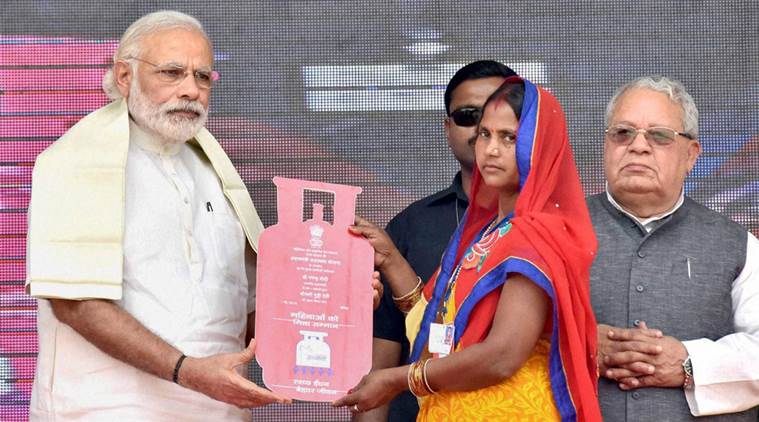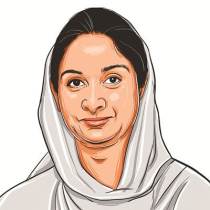Her rightful place
Schemes to develop skills, provide financial inclusion and uphold dignity are ensuring that women become a part of the growth story

Prime Minister Narendra Modi distributes the free LPG connections to the beneficiaries, under PM Ujjwala Yojana in Ballia. (PTI photo/File)
People living on the margins have been the core concern of the current government. Most such people live below the poverty level and a sizeable proportion amongst them are from the farming community. Women constitute a large chunk of the marginalised.
Farming has become non-profitable and a large number of farmers are debt-ridden. The participation of women in India’s workforce is only 27 per cent and their contribution to the country’s GDP is merely 17 per cent. The challenges before the government, therefore, were to increase the income of farmers and create conditions for the productive engagement of women. It was reckoned that if women’s participation increased to 50 per cent of the workforce, the Indian economy would see a staggering increase of $0.65 trillion.
These challenges were factored into the targets of the Ministry of Food Processing when I was assigned the task of working towards the goals of doubling farmers’ income and creating an environment conducive to the involvement of women in our economic growth. The food processing sector has emerged as a vibrant component of the overall manufacturing environment. It has attracted an investment commitment of nearly Rs 1 trillion. This year we expect 25 mega food parks to be completed. Another five such parks will be ready next year. The ministry is also creating a national cold chain grid. Several hundred projects will become operational this year. The Pradhan Mantri Kisan Sampada Yojana aims to create agro-processing clusters and backward and forward food processing linkages.
Such grass roots schemes mean more livelihood opportunities for women. For example, 14 women entrepreneurs have taken up projects in nine mega food parks, while 60 promoters of the cold chain projects are women. The government has tried to ensure that women have the skills to leverage such opportunities. The academic-cum-research institutes, National Institute of Food Technology and Entrepreneurship Technology (NIFTEM) and Indian Institute of Food Processing Technology (IIFPT), have stepped up their intake of women students. The government has also made sure that women benefit from the village adoption and training programmes.
World Food India 2017, the country’s first ever mega global food processing event of its size and scale, has delivered remarkable results and opened up new avenues for the Indian food sector globally. Projects worth $11 billion have already been auctioned by more than 30 companies. Organised retail companies and food majors of the world have scaled up their engagement in India’s food sector, setting up warehouses, collection centres and large-format stores.
While this is a source of satisfaction, I realise the potential is far greater. Women are today largely employed for sorting, grading, washing and packing in the food processing industry. In other words, illiteracy is not an impediment in their desire for financial independence. I am fortunate to be a member of Team Modi whose leader Prime Minister Narendra Modi not only recognises the potential of women but also works tirelessly to help them realise their potential. The PM has spearheaded some of the most revolutionary schemes to transform the lives of crores of women. This has ensured the increased participation of women in India’s growth story.
The government has a three-pronged strategy to empower women. First, it has focused on building their capacity for productive engagement through schemes like Beti Padhao Beti Bachao. A number of programmes have been launched to provide them access to skills and financial resources through the Pradhan Mantri Mudra Yojana. Initiatives have also been taken to provide them decent housing, sanitation and LPG connections. Third, the government is committed to framing strong legal deterrence in order to provide a secure environment to women — these include death penalty for rapists of minor girls and the Triple Talaq Bill.
The Pradhan Mantri Jan Dhan Yojana enabled 18 crore women to became part of its financial inclusion programme. Seventy-six per cent of the benefits under the Mudra Yojana have accrued to six crore women. The yojana has enabled them to avail loans and become self-reliant.
The more than 7 crore toilets and 1 crore houses constructed by the government are also means to ensure the dignity of women. The Ujjwala Yojana has lit up the lives of 5.5 crore women through LPG connections. The scheme has also given them the right to good health.
My own mission over the past 10 years in Punjab has involved improving the state’s child sex ratio. Nanhi Chhaan, an NGO I run, has trained 10,000 women, who have been given sewing machines. These women are changing the mindset of their families who would earlier consider them a liability. Nanhi Chhaan has, in fact, become a people’s movement in Punjab. For example, the Lohri of a girl child is now celebrated with as much gusto as that of male child. Saplings are distributed in social functions and bhogs as a mark of respect for environment.
The prime minister has worked tirelessly to transform, empower and enable the women of India to play a pivotal role in our country’s march towards becoming a global economic super power. I am grateful to him for making me part of this journey.
The writer is the Union Minister for Food Processing







































No hay comentarios:
Publicar un comentario